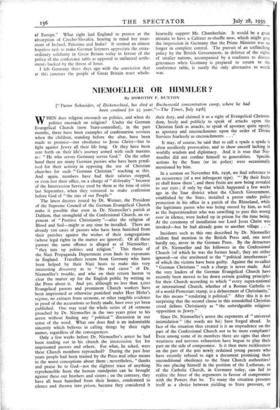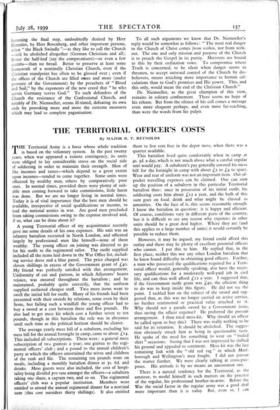NIEMOELLER OR HIMMLER ?
By DOROTHY F. BUXTON
[" Pastor Schneider, of Dickenschied, has died at Buchenwald concentration camp, where he had been confined for 21 years."—The Times, Ply 24th] WHEN does religion encroach on politics, and when do politics encroach on religion? Under the German Evangelical Church (now State-controlled), in the past months, there have been examples of confirmation services when the children, standing before the altar, have been made to promise—not obedience to Jesus Christ—but to fight against Jewry all their life long. Or they have been sent forth on their life's journey armed with such maxims as : "He who serves Germany serves God." On the other hand there are many German pastors who have been penal- ised for their activity in opposing the use of Christian churches for such "German Christian" teaching as this.
And again, numbers have had their salaries stopped, or even lost their office, on a charge of " disloyalty " because of the Intercession Service used by them at the time of crisis last September, when they ventured to make confession before God of "the sins of our People."
The latest decrees issued by Dr. Werner, the President of the Supreme Council of the German Evangelical Church make it possible that even in Dr. Niemoeller's parish at Dahlem, that stronghold of the Confessional Church, an ex- ponent of "Positive Christianity "—alias the religion of Blood and Soil—might at any time be installed. There are already ioo cases of pastors who have been banished from their parishes against the wishes of their congregations (whose legal rights in the matter are ignored). Of all these pastors the same offence is alleged as of Niemoeller : "they mix up politics and religion." This thesis of the Nazi Propaganda Department even finds its exponents in England. Travellers return from Germany who have been helped by their Nazi hosts to make this very interesting discovery as to "the real cause" of Dr. Niemoeller's trouble, and who on their return hasten to clear the matter up for the English public by writing to the Press about it. And yet, although no less than 2,000 Evangelical pastors and prominent Church workers have been imprisoned or otherwise punished under Herr Hitler's regime, no extracts from sermons, or other tangible evidence in proof of the accusations so freely made, have ever yet been published. One may read the whole series of 28 sermons preached by Dr. Niemoeller in the two years prior to his arrest without finding any " political " discussion in our sense of the word. What one does find is an indomitable sincerity which believes in calling things by their right names, regardless of the consequences.
Only a few weeks before Dr. Niemoeller's arrest he had been reading out in his church the intercession list for imprisoned pastors and others. For what, he asked, were these Church members reproached? During the past four years people had been trained by the Press and other means to the worst conceptions about them ; nevertheless, "thanks and praise be to God—not the slightest trace of anything reprehensible from the human standpoint can be brought against these our brothers and sisters ; on the contrary, they have all been banished from their homes, condemned to silence and thrown into prison, because they considered it their duty, and claimed it as a right of Evangelical Christen- dom, freely and publicly to speak of attacks upon the Christian faith as attacks, to speak of apostasy quite openly as apostasy and encroachments upon the order of Divine Services fearlessly as encroachments. . ."
It may, of course, be said that to call a spade a spade is often needlessly provocative, and to show oneself lacking in worldly wisdom and diplomacy. And it is true that Nie- moeller did not confine himself to generalities. Specific actions by the State (or its police) were occasionally mentioned by him.
In a sermon on November 8th, 1936, we find reference to an occurrence (of a not infrequent type). "By their fruits ye shall know them ', and these fruits are now being revealed to our eyes ; if only by that which happened a few weeks ago in the Saar district when the Church Government, established by the State, installed a pastor under police protection in his office in a parish of the Rhineland, while the legitimate pastor who was being ousted by him, as well as the Superintendent who was unwilling to pass this wrong over in silence, were locked up in prison for the time being. At the ceremony of installation our Lord Jesus Christ was invoked—but he had already gone to another village . . ."
Incidents such as this one described by Dr. Niemoeller seldom find mention in the British Press and, one need hardly say, never in the German Press. By the detractors of Dr. Niemoeller and his followers in the Confessional Church (of which he was the former head), they are either ignored—or else attributed to the "political interferences" of which the victims have been guilty. Against the so-called "German Christians" such a charge is never made. And the very leaders of the German Evangelical Church have recently been moved to lay down certain guiding principles for their Church according to which "every supra-national or international Church, whether of a Roman Catholic or of a world-Protestant stamp, is a debasement of Christianity," for this means "rendering it political." After this it is not surprising that the second clause in this remodelled Christian creed defines Christiantiy as "the unbridgeable religious opposition to Jewry."
Since Dr. Niemoeller's arrest the exponents of "universal intimidation" (the words are his) have forged ahead. In face of the situation thus created is it an imprudence on the part of the Confessional Church not to be more compliant? Even among some of its members there are signs that sheer weariness and nervous exhaustion have begun to play their part on the side of compromise. Is it then mere recklessness on the part of the 9oo newly ordained young pastors who have recently refused to sign a document promising their unconditional obedience to the State Church authorities? No one placing himself in the position of the Lutheran, or of the Catholic Church, in Germany today, can fail to realise the force of the arguments in favour of compromise with the Powers that be. To many the situation presents itself as a choice between yielding to State pressure, or hastening the final step, undoubtedly desired by Herr Hiramler, by Herr Rosenberg, and other important persons, when "the Black Swindle "—as they like to call the Church —will be abolished altogether (German Christians and all). Better the half-loaf (say the compromisers)—or even a few crumbs—than no bread. Better to preserve at least some framework of a nominally Christian Church, even if the Christian standpoint has often to be glossed over ; even if the offices of the Church are filled more and more (under pressure of the Government) by the preachers of "Blood and Soil," by the exponents of the new creed that "he who serves Germany serves God." To such defenders of the Church the resistance of the Confessional Church, and notably of Dr. Niemoeller, seems ill-timed, defeating its own ends by provoking more and more the extreme measures which may lead to complete paganisation. To all such arguments we know that Dr. Niemoeller's reply would be somewhat as follows : "The most real danger to the Church of Christ comes from within, not from with- out. The one and only mission and purpose of the Church is to preach the Gospel in its purity. Ministers are bound to this by their ordination vows. To compromise where Truth is concerned, to be silent when danger seems to threaten, to accept outward control of the Church by dis- believers, means attaching more importance to human cal- culations than to God's promises and His power. This, and this only, would mean the end of the Christian Church."
Dr. Niemoeller, as the great champion of this view, remains in solitary confinement. There seems no hope of his release. But from the silence of his cell comes a message even more eloquent perhaps, and even more far-reaching, than were the words from his pulpit.









































 Previous page
Previous page